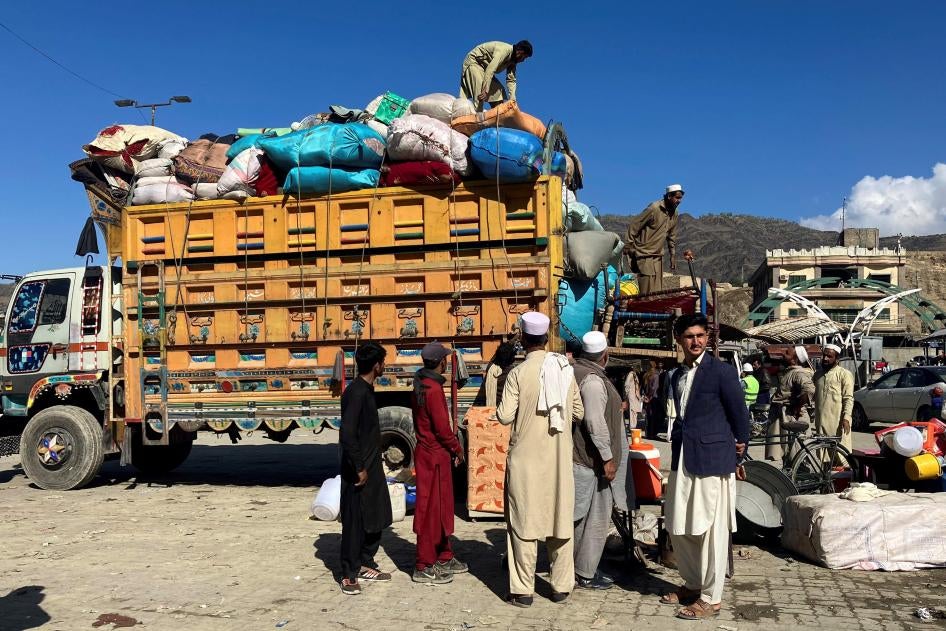Human Rights violations by Pakistan Authorities against Afghan refugees

According to Human Rights Watch, the Pakistani police and other agencies carried out mass detentions, seized property and livestock, and destroyed identity documents to expel thousands of Afghan refugees and asylum seekers. Since mid-September 2023, Pakistani authorities have forced out more than 3,75,000 Afghans to Afghanistan, deporting 20,000 of them.
The Pakistan authorities committed “widespread abuses” against Afghans living in the country to compel them to return to Afghanistan leading to a situation of humanitarian crisis, Human Rights Watch said in a statement on Wednesday.
“Pakistani officials have created a coercive environment for Afghans to force them to return to life-threatening conditions in Afghanistan,” said Elaine Pearson, Asia director at Human Rights Watch.
“The authorities should immediately end the abuses and give Afghans facing expulsion the opportunity to seek protection in Pakistan,” he added.
Among those being deported or coerced to leave are Afghans who were born in Pakistan and never lived in Afghanistan, and Afghans who would be at risk of persecution in Afghanistan, including women and girls, human rights defenders, journalists, and former government employees who fled Afghanistan after the Taliban takeover in August 2021.
According to Human Rights Watch, the mistreatment is part of a ‘campaign’ to compel Afghans to leave the country, human rights activists and journalists reported.
It includes night raids during which police have beaten, threatened and detained Afghans. The United Nations and International Organization for Migration (IOM) reported that 92 per cent of Afghans leaving Pakistan said that they feared detention by Pakistani authorities.
Police have also demanded bribes and confiscated jewellery, livestock, and other property, and bulldozed homes. Some Afghan women told Human Rights Watch that Pakistani police had sometimes ‘sexually harassed’ women and girls and threatened them with sexual assault.
However, Pakistani officials have blamed Afghans for a recent uptick in attacks by militant groups, linking these to “illegal migrants.”
Pakistani authorities have also reportedly required Afghans awaiting resettlement in the United States, United Kingdom, and other countries who have not been able to obtain or, in many cases, renew visas, to pay an exit fee of USD 830. The charge only applies to those not going to Afghanistan.
On November 17, the United Nations High Commissioner for Refugees (UNHCR) said that the arrival in Afghanistan of hundreds of thousands of Afghans “couldn’t have come at a worse time,” as winter has set in and the country faces a prolonged economic crisis that has left two-thirds of the population in need of humanitarian assistance.
Because Pakistani authorities have prohibited Afghans from carrying more than 50,000 Pakistani rupees per person (USD 175) out of the country, many have left behind businesses and arrive in Afghanistan virtually destitute. Humanitarian agencies have described shortages of tents and other basic services for those arriving, Human Rights Watch stated.
On November 10, Pakistan officials extended the validity of ID documents for Afghans who were previously able to obtain Proof of Registration (PoR) cards, but only until December 31.
However, humanitarian aid workers told Human Rights Watch that Pakistani police have sometimes confiscated or destroyed these cards during raids. Cardholders have also been among those coerced to return to Afghanistan despite their registered status. Pakistan’s “Illegal Foreigners’ Repatriation Plan,” announced on October 3, includes three phases, with the expulsion of cardholders to follow those without documentation.
These deportations violate Pakistan’s obligations as a party to the United Nations Convention Against Torture and under the customary international law principle of non-refoulment: not to forcibly return people to countries where they face a clear risk of torture or other persecution.
Refoulement occurs not only when a refugee is directly rejected or expelled, but also when indirect pressure is so intense that it leads people to believe they have no option but to return to a country where they face a serious risk of harm. The Pakistani government should end police abuses and deportation threats and work with UNHCR to resume registration of Afghan asylum seekers.
The Human Rights Watch further said that countries including the US, UK, Germany, and Canada should expedite resettlement for Afghans who are particularly at risk, including women and girls, LGBT Afghans, human rights activists, and journalists.
“Governments that promised to resettle at-risk Afghans should expedite these processes, while pressing Pakistan to live up to its human rights obligations,” Pearson said.
“Countries should also step up their response to the humanitarian crisis in Afghanistan, now compounded by the influx of hundreds of thousands of people in need at the onset of winter,” he added.



